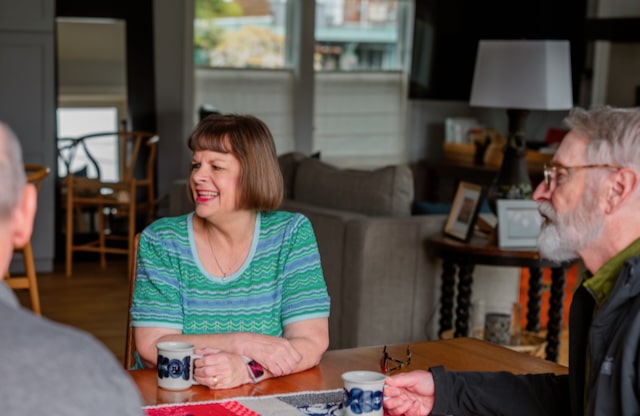Community Government
Barber emphasizes collaborative community governance in mayoral bid
Mary Barber doesn’t see her mayorship as part of career in politics. Instead, she sees it as community service.
“In fact, my husband will say that if somebody refers to me as a politician, I explain this to them in a very nice way,” Barber says with a laugh. She’s on the porch in the Friday midafternoon sun of a late September day, speaking over the phone with Gig Harbor Now.
“I grew up with parents and older adult influences that taught me that it’s our responsibility to try to leave the world a better place than we found it,” Barber continues. “And that has really been my focus my entire life.”
Early career path
Barber became mayor after former Mayor Tracie Markley stepped down in November 2024. The City Council nominated Barber, then a city councilmember, to fill the post. Barber noted that her mayorship was a little coincidental, since she won Markley’s council seat after Markley ran for mayor in 2021.
Now, Barber is running for a full term as mayor against Chris Haywood, a first-time candidate.

Mayor Mary Barber speaks with constituents. Photo courtesy Mary Barber
Barber was born in Seattle and pursued a path of service starting at a young age. She remembers a neighborhood association her parents started, specifically because “as kids, we had a giant map of the area where we lived in our playroom.”
“Business leaders would come up and they would talk about which buildings came down and which buildings went up to save the neighborhood, but also allow … infrastructure to continue to grow,” Barber recalled. “And I think that’s also when I learned that you could collaborate with people who you don’t necessarily always agree with, as long as you listen for the common threads.”
Barber started teaching Sunday school when she was in sixth grade. By high school, Barber had started leadership training with the Red Cross. She was a member of The Junior League (now called Junior League International), an organization founded in 1901 to advance women’s leadership in communities. By college, Barber was one of her sorority’s leaders at Whitman College and went on to serve on Whitman’s alumni board for 10 years.
But it was her and her husband’s move to Alaska that landed Barber on the political track.
Political service
Barber continued to serve on boards in Anchorage, where she and her husband lived for more than 20 years, and opened her own public relations business. But it was U.S. Sen. Lisa Murkowski’s loss in the 2010 Republican primary that got Barber interested in politics.
Barber and Murkowski knew each other through their kids, who played soccer and attended Boy Scouts together. When Tea Party candidate Joe Miller narrowly defeated Murkowski in the Republican primary, Barber and others in the community thought, “Oh no, what are we going to do now?
“And we went to her and said, ‘Lisa, you’ve got to run as a write-in. And she kept saying, ‘No, no, no,’” Barber recalled. “Then one day I got a message that I was supposed to be somewhere … and she asked me to serve as a senior communications advisor on her campaign.”
Barber closed her business for eight weeks and directed public relations for Murkowski’s write-in campaign. Murkowski won the campaign as a write-in, the first politician to do so since 1954, when Strom Thurmond won South Carolina’s senatorial race as a write-in candidate.
While Barber admitted she doesn’t always agree with Murkowski and the decisions she makes, she said that she admires the person Murkowski is and her commitment to doing what is right.
When Barber and her husband Alan retired to Gig Harbor, Barber joined the Parks Commission. Barber said that decision again was prompted by a desire to do what she thought was right, rather than in pursuit of politics. On the commission, Barber helped develop the city’s Parks, Recreation, and Open Space (PROS) Plan. From there felt “called to serve” in a bigger way, as a city councilmember, until her appointment as mayor in 2024.
Affordable housing
Affordable housing — or “attainable housing,” as Barber puts it — is one of the biggest topics both in Washington and across the country. Barber said that, if elected, she wants to work with state legislators to address Gig Harbor’s affordable housing needs.
She said she believes current state mandates regarding municipalities’ comprehensive plan updates have helped to pave the way for developers to build more affordable housing. But she said the plan the Legislature put forth in the Growth Management Act is more of a rigid, “one-size-fits-all” blueprint that has made it difficult for Gig Harbor to meet the stipulations.
“The problem that we have at Gig Harbor is we don’t have much developable land,” she explained. The plan mandates that the city build just shy of 800 new homes. “We have the centers of local importance that hopefully are where we will see these [affordable housing development] proposals come in because that’s where we think it makes the most sense. But … the state said you have to build 798 homes, and you should build those near buses. But we only have one bus route.”
She said that one growth tool the city, like others, has looked at is the multi-family tax exemption. However, she said, the downside is that this tax falls onto property tax payers.
“I think that we have to look at all the tools that are available to us, and I rely on our planning department to be able to provide us with an analysis of those tools for a specific development when that development comes forward,” she said. “At the present time, I think we have the plan that will allow those developments to come forward, but we don’t have any development plans yet. So, once we see those, then our planners can say, ‘Okay, this is really what they need,’ and then we can say yes or no.”
Barber emphasized that “when we say attainable and affordable housing, we’re talking about entry-level teachers, entry-level policemen, nurses, that kind of thing — and these are people like my sons, who can’t afford to buy a home here but want to live here.”
“If we can come up with solutions that will allow that to happen, we also have a positive impact on climate change because you’re not driving as far as you’re driving at all,” she added. “We’re also helping our own community because people who currently have to commute here want to live here, and they want to be part of the community, and many of them consider themselves part of the community. They just don’t live here.”

Community input and cooperative governance
Barber also said that one of the biggest things she will continue to focus on, if elected, will be seeking community input and finding common threads in community wants and needs. She, Councilmember Le Rodenberg, and Councilmember Ben Coronado are part of the Washington Collaborative Elected Leaders Institute (WA-CELI), an organization in its second year that provides training for electeds to learn how to better collaborate with one another and effectively govern across differing mindsets and values.
Barber said that she and the councilmembers are excited to apply what they have learned, both within Gig Harbor’s government and within the community.
For instance, Barber said, if she and some city councilmembers wanted a community center, they wouldn’t find funding or create a plan first. They would seek community input first — and the input might not be from expected groups.
“What we would do with the community center — we’re pretty sure we want it to have a youth component. So we’re hoping to go to the high schools and talk to the kids there, and say, ‘What do you want?’” Barber said. “And then use that information to be able to create a plan. … But we will know what the community as a whole wants before we do that.”
She also said that she would focus on economic development, because she understands that many are feeling financially squeezed. But she will only do this after talking with business owners.
“We need to ask the business community what their needs are before we make assumptions,” Barber said. “I would like us to make sure that we are supporting our existing businesses especially as best we can in these tough times.”
Barber said that “there has been a lot of learning on the fly.” One of the biggest things she has learned to do on the job is to delegate tasks. After two decades of running her own PR firm, delegating was a skill she had to both relearn and with which she had to be OK.
“I learned really quickly to manage my time, and try as hard as I can to set boundaries so that I have balance, because there’s a lot to do. You could do this job 24 hours a day if you wanted to,” Barber said. “You have to … know that the team is there to help and support you. It wasn’t a trust thing, it’s just remembering that they’re there.”
